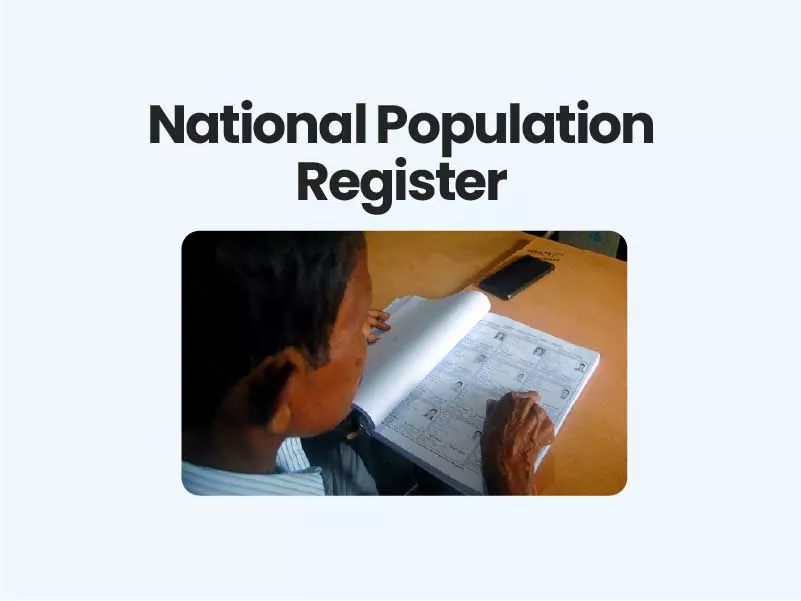Companion@360 → 7 Month programme to sharpen your writing skills → REGISTER NOW

National Population Register (NPR)
- The National Population Register (NPR) is a Register of usual residents of the country. It is being prepared at the local (Village/sub-Town), sub-District, District, State and National level under provisions of the Citizenship Act 1955 and the Citizenship (Registration of Citizens and issue of National Identity Cards) Rules, 2003.
- It is mandatory for every usual resident of India to register in the NPR. A usual resident is defined for the purposes of NPR as a person who has resided in a local area for the past 6 months or more or a person who intends to reside in that area for the next 6 months or more.
Objectives of National Population Register
- The objective of the NPR is to create a comprehensive identity database of every usual resident in the country.
- The database would contain demographic as well as biometric particulars.
WHO IS USUAL RESIDENT OF INDIA
- A usual resident is defined, for the purposes of the NPR, as a person who has resided in a local area for the past six months or more, or a person who intends to reside in that area for the next six months.
- The law compulsorily seeks to register every citizen of India and issue a national identity card.
Competition (Amendment) Bill, 2020
WHO WILL CONDUCT NPR ?
The process of updating NPR will be carried out under the aegis of the Registrar General and ex-Officio Census Commissioner, India.
Demographic Particulars:
| The following demographic details of every individual are required for every usual resident: |
| · Name of person
· Relationship to head of household · Father’s name · Mother’s name · Spouse’s name (if married) · Sex · Date of Birth · Marital status · Place of birth · Nationality (as declared) · Present address of usual residence · Duration of stay at present address · Permanent residential address · Occupation/Activity · Educational qualification WHEN AND WHERE NPR WILL BE CONDUCTED The process of collecting information for NPR will start in April 2020 |
Present Status:
- The data for National Population Register was collected in 2010 alongwith the houselisting phase of Census of India 2011.
- The updation of this data was done during 2015 by conducting door to door survey. The digitisation of the updated information has been completed.
- Now it has been decided to update the National Population Register along with the Houselisting phase of Census 2021 during April to September 2020 in all the States/UTs except Assam.
Implementation of the Code on Wages Act, 2019
Challenges:
- The concerns over the Citizen Amendment Act (CAA) has prompted several state governments to halt the ongoing data collection process for a National Population Register (NPR).
- The fear is that the information sought under NPR is much wider in scope and could potentially be used to target a section of the society.
- NPR is not just a census exercise, but a larger data convergence project that can result in the government putting its citizens under surveillance, that is unwarranted and dangerous to the secular and constitutional credentials of the country.
NPR Vs Census:
- While the process of NPR and Census will begin simultaneously, the two databases are not same.
- The decennial census is the largest single source of a variety of statistical information on different characteristics of the people of India.
- While NPR only contains demographic information, more details are required for census like information on demography, economic activity, literacy and education, and housing and household amenities besides others.
- The census is the basis for reviewing the country’s progress in the past decade, monitoring the ongoing schemes of the government and plan for the future.
- The census provides detailed and authentic information on demography, economic activity, literacy and education, housing and household amenities, urbanisation, fertility and mortality, scheduled castes and scheduled tribes, language, religion, migration, disability besides others.
- The enumerators also collect data related to cultivators and agricultural labourers, their sex, occupational classification of workers in the non-households industry, trade, business, profession or service by class of worker and sex.
- There will be a detailed survey on gender and literacy rate, a number of towns, slum households and their population.
- Information is also collected on sources of potable water, energy, irrigation, method of farming, whether a house is a concrete, thatched or others.
HOW IS NPR DIFFERENT THAN NRC ?
- National Population Register is a database of people living in India, citizens or not, but National Resgiter of Citizens is a database of Indian citizens.
- The NRC process demands proof of citizenship from the respondents. Those who found in wnat of the proof may face deportation or detention in long run. But in NPR, there is no need to provide any document.
Conclusion:
- NPR data helps identify the demographics of actual residents who will be direct beneficiaries of any schemes launched in the area.
- The NPR data will help government design and adapt schemes like Ayushman Bharat, Jandhan Yojna, or medium of instruction in schools as per the current demographics, thus making the schemes more effective.
